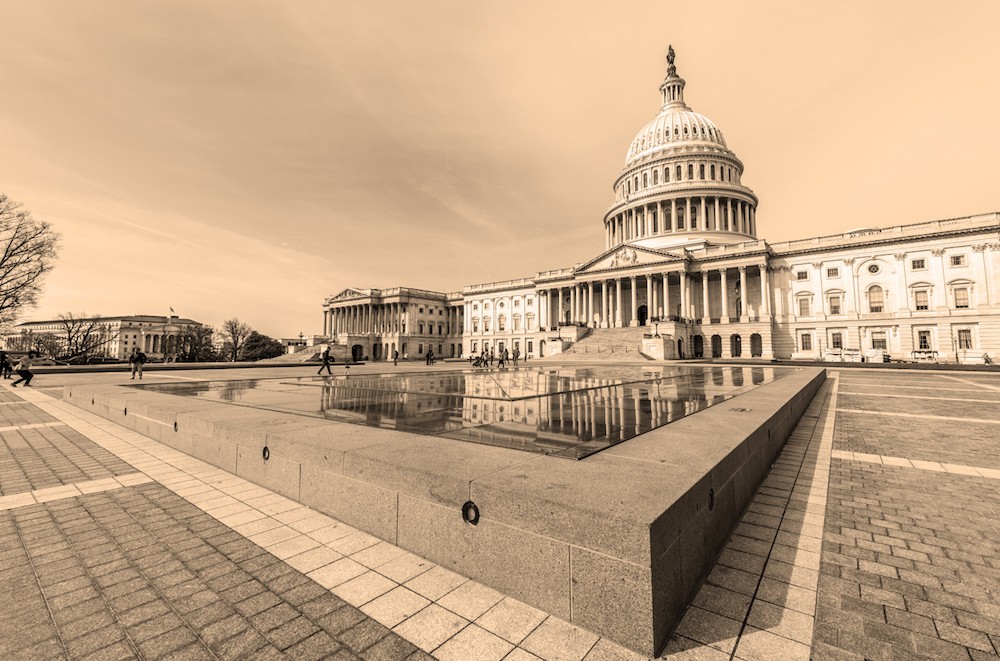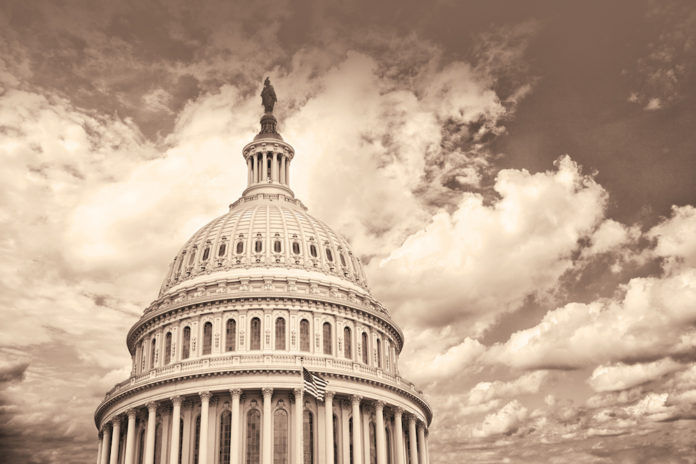When cannabis was de facto outlawed in the United States in 1937 with the Marihuana Tax Act, reefer madness and racism were the primary motivations. But when the U.S. government doubled down in 1970 by passing the Controlled Substances Act, classifying the plant as a Schedule 1 substance having a high potential for abuse and no accepted medical use, cannabis became an even more controversial issue.
Today, the U.S. government and citizens at large embrace a more informed perspective on cannabis and the country finally appears to be at a tipping point, with a majority of Americans favoring federal legalization.
Thirty-three states and the District of Columbia have fairly broad medical cannabis programs, and ten of them also have legalized recreational use. Revenues from the booming industry have provided powerful incentive for politicians who now are proposing legislation at the federal level to protect and support cannabis companies and users. With Democrats setting the agenda in the House of Representatives and public support growing for legalization and/or liberalization of cannabis laws, lawmakers on both sides of the aisle have shown more urgency to make groundbreaking reforms in 2019.
Politicians opposed to cannabis reform no longer can point to some of the tired, debunked arguments they’ve used in the past to defend prohibition, as states with legal industries have experienced very few negative consequences of legalization. Moreover, as a growing number of red states pass medical cannabis laws—most recently Louisiana, West Virginia, Oklahoma, Arkansas, and Utah—it’s clear the tide is turning, and cannabis-friendly ballot measures in the 2020 election are sure to put even more pressure on GOP candidates in key swing states.
So, what strides can politicians realistically make in 2019 to help cannabis businesses across the United States start to resemble other legal, commercialized industries?
The STATES Act is a beautiful piece of legislation that would very clearly and efficiently take care of a lot of issues in the industry.—Saphira Galoob, CEO, The Liaison Group
Cannabis on the campaign trail
When anti-cannabis Attorney General Jeff Sessions resigned in 2018, Democrats didn’t take long to ramp up the conversation regarding sensible, progressive cannabis policies and introduce new bills to help the industry deal with some of its most pressing issues: lack of banking and payroll services, protection from federal prosecution in canna-legal states, tax codes that penalize retail operators by preventing expense deductions (Internal Revenue Code §280E), and veterans’ access to medical cannabis.
Sixty-six senators represent constituents who support the cannabis cause on some level. In 2018, many of them were among the large majority who passed a criminal justice reform bill. They also voted to legalize hemp in the 2018 Farm Bill. While Democrats more or less are united in their support for reforms big and small, Republicans continue to drag their feet on cannabis, with the exception of representatives in canna-legal states. Because Republicans control the Senate, comprehensive cannabis bills are unlikely to pass in 2019, but cannabis advocates are optimistic issues such as banking and states’ rights are within reach.
“Cory Gardner’s evolution on cannabis policy is welcomed and we’re glad to have him, but we need him to be more effective in influencing members of his caucus to advance reform,” said Justin Strekal, political director for the National Organization for the Reform of Marijuana Laws (NORML). “In the previous Senate, four GOP senators caucused to join him, and [Jeff] Flake did not return. So, we have yet to see if [Gardner] can grow that support.”
In 2018, support for federal legalization climbed to 61 percent—with Republicans chiming in at 54 percent—according to the General Social Survey, which has measured support on the issue since the 1970s. If this widespread support isn’t enough to convince politicians to get with the program, then the impressive growth of the industry and its tax contributions very well might. Cannabis sales are expected to hit $23 billion by 2022, according to BDS Analytics, and state and local excise tax collections on retail cannabis sales surpassed $1 billion for the first time in 2018, marking a 57-percent increase over 2017 levels.
The list of prominent Democrats who support some form of comprehensive legalization grows by the day. Declared 2020 presidential hopefuls who have taken the issue on the campaign trail include Elizabeth Warren, Bernie Sanders, Beto O’Rourke, Kamala Harris, Cory Booker, and Amy Klobuchar. Whether federal legalization becomes a major campaign issue in 2020 remains to be seen; regardless, 2019 is shaping up to be a breakthrough year for cannabis in the House.

Pressure building for major reforms
Three comprehensive reform bills calling for removal of cannabis from the Controlled Substances Act are pending before Congress: The Marijuana Justice Act, introduced by Booker; the Ending Federal Prohibition Act, sponsored by Representatives Tulsi Gabbard (D-HI) and Don Young (R-AK); and, the Marijuana Freedom and Opportunity Act, sponsored by Senator Chuck Schumer (D-NY).
“The main goal for 2019 is to get a hearing on at least one of the comprehensive bills,” said Morgan Fox, media relations director for the National Cannabis Industry Association (NCIA). “Sometimes a specific bill becomes a way to air the issue on the House floor. So long as we get a hearing on a comprehensive bill, it would be a huge sign of progress. It’s questionable that anything would come to a vote, but it’s looking like there will be a whole House hearing.”
The Ending Federal Prohibition Act bill would end the prohibition of marijuana, as well as eliminate criminal penalties for those who import, export, manufacture, distribute, or possess cannabis products. When Gabbard and Young introduced the bill in March, they also presented the Marijuana Data Collection Act of 2019, which would study the effects of state-legal medicinal and non-medicinal marijuana programs from a variety of perspectives, including state revenues, public health, substance abuse and opioids, criminal justice, and employment.
Strekal said the Marijuana Justice Act had forty-four members of the House on board during the last session of Congress and predicts it should “far exceed that” in the new session, making the act the most widely supported single bill proposing to de-schedule in history. Similarly, the Ending Federal Prohibition Act had forty co-sponsors and was the first de-scheduling bill to attract significant bipartisan support.
“The reason why those bills received such support and over two dozen co-sponsors is the political pressure of the American people, which is starting to translate to the halls of Congress,” Strekal said. “And it’s in no small part due to the Congressional Cannabis Caucus. On the Democratic side, we’re seeing more and more senators jumping over themselves to talk about this issue, because they see incredibly strong support in the electorate at large.”
The Congressional Cannabis Caucus was formed in 2017 to help reconcile federal laws prohibiting medical and recreational cannabis use with state laws that are more permissive. In 2019, the caucus leadership team includes founder and co-chair Representative Earl Blumenauer (D-OR); Representative Barbara Lee (D-CA), who will become the first woman of color to co-chair the Caucus; Representative David Joyce (R-OH); and returning co-chair, Representative Don Young (R-AK).
Some other prominent bills that have been proposed include the CARERS Act, which would expand marijuana research and allow doctors to discuss cannabis with veterans, and H.R. 420 (the Regulate Marijuana Like Alcohol Act), which would de-schedule cannabis and shift regulatory authority to the Bureau of Alcohol, Tobacco, and Firearms.
Strekal explained these bills haven’t gained as much support for various reasons, including being too narrow or too broad in scope. And therein lies one of the dilemmas for lawmakers looking to pass legislation in the political climate of 2019.
The list of prominent Democrats who support some form of comprehensive legalization grows by the day.
One bill at a time
If there are two issues most politicians in the House can get behind in the cannabis legislation debate, it’s medical cannabis and states’ rights.
At the SXSW conference in Austin, Texas, in March, former Speaker of the House John Boehner and Acreage Holdings Chairman and Chief Executive Officer Kevin Murphy discussed the state of affairs in D.C. Boehner predicted Congress will pass the STATES Act, which would represent a major breakthrough for the industry.
The Strengthening the Tenth Amendment Through Entrusting States (STATES) Act was introduced in 2017 by Cory Gardner (R-CO) and Elizabeth Warren (D-MA) and would allow states to legalize cannabis through their legislatures and then enforce state laws without federal interference. President Trump already has indicated he would be likely to sign such a bill, and this may account for the enthusiasm and support for this bipartisan legislation. “The federal government just needs to get out of the way,” Boehner said. “Right now, I think the STATES Act is where most of the momentum is.”
Saphira Galoob, chief executive officer for The Liaison Group in D.C., represents and lobbies on behalf of several of the largest cannabis operators in the U.S., including Acreage Holdings. She also consults with the California Cannabis Industry Association and the recently formed National Cannabis Roundtable.
“We believe a states’ rights approach is the most expedient way to address the total solution,” Galoob said. “The STATES Act is a beautiful piece of legislation that would very clearly and efficiently take care of a lot of issues in the industry. It isn’t perfect, and it doesn’t comprehensively address some of the concerns, but it does address the scheduling issue and the legality of cannabis, which solves tax and banking for most industry stakeholders.”
Strekal noted that in the previous session of Congress, sixty-three different bills addressed various aspects of regulation and de-scheduling, as well as what a regulated marketplace might look like. Most of the bills were designed to bring the cannabis industry into alignment with more traditional businesses with regard to banking, payroll, investment, employment, and research protections.
Boehner sits on Acreage’s board of directors and serves as the chairman of the National Cannabis Roundtable, which advocates for a “rational legal framework for cannabis reform.” Given the organization’s political connections, it’s worthwhile to note its current agenda priorities:
Remove federal restrictions prohibiting medical research involving cannabis. Encourage the development of solutions that will improve the lives of veterans and patients and combat the opioid epidemic in the United States.
Allow companies operating legally in the cannabis industry to utilize traditional institutions for transactions and access to financial markets.
Correct flaws in the U.S. tax code that serve as barriers to legal commerce in the cannabis industry and prohibit the development of solutions that can improve Americans’ lives.
Build support for, and secure enactment of, federal legislation allowing states to set and enforce their own laws governing cannabis.
“If our industry doesn’t get something major passed, it will be because we have not all aligned on what the priorities should be,” said Galoob. “That lack of alignment creates confusion on the Hill, and it also dilutes our political strength by not all being behind one initiative.”
If our industry doesn’t get something major passed, it will be because we have not all aligned on what the prioritiesshould be.—Saphira Galoob, CEO, The Liaison Group
Dollars and sense
If you talk to retail operators about their biggest headache, banking likely will top the list. Access to traditional banking services and investment opportunities has been a major impediment to growth, and the constant shuttling of cash in briefcases and duffle bags creates a public safety issue.
“Banking and unfair taxation are the issues that have hit the industry hardest,” said Fox. “280E is the biggest problem, because it doesn’t let them deduct business expenses, which is a huge tax burden. Meanwhile, the federal government has been happy to collect those taxes. We’ve been working on banking for a number of years and are starting to get good support in the House.”
Blumenauer is a longtime advocate for cannabis policy reform and was the founder of the Congressional Cannabis Caucus. In a memo last year to party leaders, he suggested Democrats pursue a more methodical approach in 2019 and recommended financial services and other committees start by holding hearings on incremental reforms like banking access, research expansion, and medical cannabis for military veterans. A House bill to prevent punishment of banks that work with state-legal marijuana businesses, introduced by Denny Heck (D-WA) and Ed Perlmutter (D-CO), garnered ninety-five co-sponsors in the last Congress and twenty senators signed onto a companion bill, but neither were given hearings or brought up for votes.
In late March, the SAFE Banking Act of 2019 cleared the House Financial Services Committee. It is cosponsored by 152 representatives, or one-third of the chamber.
Fox said he believes the SAFE Banking Act has a good chance of passing, along with some of the other focused bills that address veterans’ access and cannabis data collection. NCIA tracks all the legislation that has been introduced and has been trying to get as many co-sponsors as possible for all the bills. “We’re supporting the more narrowly focused bills like the banking act and taxation issues,” said Fox. “But it’s important to support them all, because it moves the conversation along.”
While progress on banking, research, and other issues are important steps, many cannabis advocacy groups are concerned a piecemeal approach could take eyes off the ultimate goal of federal legalization and undermine progress on the important social equity and justice issues stemming from the decades-long war on drugs. Jason Ortiz, vice president of the Minority Cannabis Business Association, believes having African American politicians such as Booker and Lee address social justice issues bodes well for the cause.
“For us, the big piece is an office of justice reinvestment that would be a watchdog agency to make sure people are getting released from prisons, to make sure records are expunged properly, to make sure money goes to the communities where it’s supposed to go,” Ortiz explained. “We’ve been pushing that at every level of government. Of course we support de-scheduling cannabis, but that doesn’t address the historical context we’re in. We also have to address social justice, or we’re going to continue to see those communities suffer.”
At this point few, if any, good models for social justice programs exist, according to Ortiz. He did acknowledge California is leading the way in social equity policies and thought leadership, but up to this point only a small number of social equity operators are licensed.
“Aside from trying to get more co-sponsors for all these bills, they’ve done a good job of shifting away from ‘do we legalize’ to ‘how [do we legalize]’ and bringing racial equity and social justice questions into the conversation, which is really important,” Fox said.

Will hemp pave the way?
The 2018 Farm Bill is one of the most important recent breakthroughs. The legislation removed hemp from the U.S. Controlled Substances Act and opened the door for investors to enter the U.S. cannabis industry. It also eliminated most of the barriers to growing, processing, transporting, and selling hemp. The way the hemp industry methodically approached—and eventually reached—its goal may provide a lesson and precursor for the larger cannabis industry.
“You have to understand how we’ve gotten to where we are on hemp,” said Patrick Goggin, a senior attorney with Hoban Law Group who has worked on hemp and cannabis reform for two decades. “It’s never been through standalone legislation, and we never had it pass at the federal level. It was always through spending provisions or the Farm Bill. So, we could see something in additional provisions in budget and spending bills, or there may be something happening on the CBD side.”
Of course, the Food and Drug Administration still must weigh in on how THC levels will be regulated and how chemical compounds derived from hemp can be incorporated into products such as lotions, tinctures, and foods.
“The hemp industry has definitely spurred a lot of interest in state governments,” said Fox. “Now that companies are moving forward with applications for hemp programs, those will create business opportunities and new jobs, which will drive more discussion and pressure.”
While there’s no denying cannabis bills have made major progress over the past few years—Strekal noted sixty-three pieces of legislation were introduced in one session, more than all previous sessions combined—concern exists that the corporate agenda will drown out important discussions about patients’ rights and social equity.
“There is clearly momentum on our side,” Fox said. “And, as our political power progresses, we must shape the policy we want going forward to protect rights and freedoms of individual consumers and lay a stable foundation as this nascent economy matures.”
For old-school reform advocates like Goggin, watching the cannabis-policy merry-go-round at the federal level has not inspired much optimism, despite all the current activity.
“Frankly, I stopped paying attention to cannabis legislation at the federal level a long time ago, because it never goes anywhere. What’s different now?” he asked. “It’s all about Congress, and they have shown no appetite for pushing the ball down the road. Maybe we’re getting closer, and this will actually happen sooner than later. That’s what happened with hemp: We made zero progress, then really quick progress. We get used to waiting, and it comes when it comes.”












